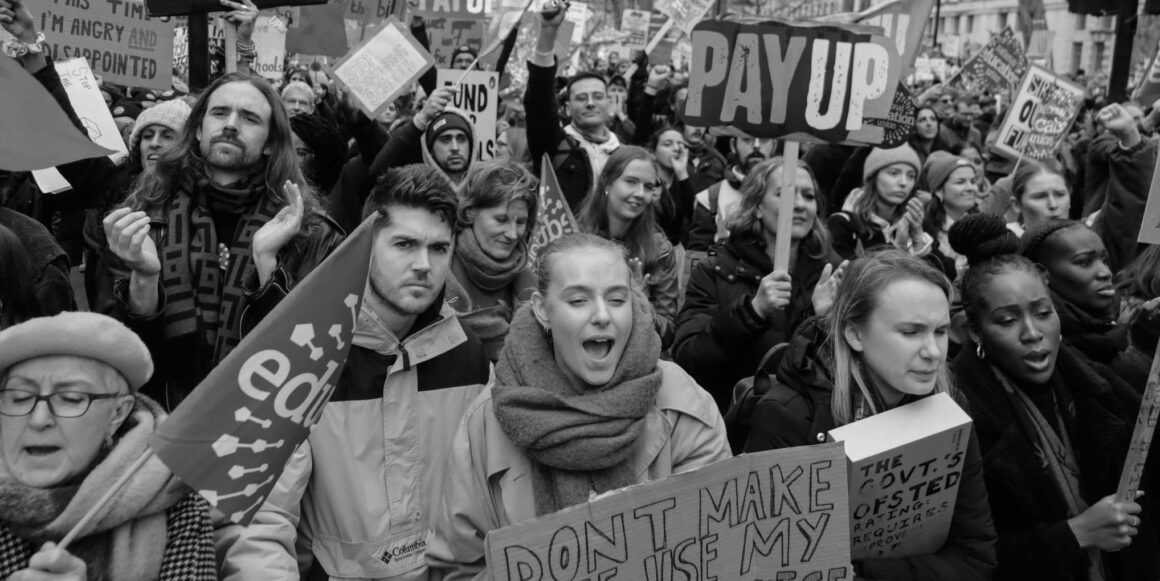

What these retreats have revealed is that in most unions it is possible for general secretaries and the national and regional full time officials to block or abandon action voted for by their members or democratically elected lay executives. Even a left-led union like the posties (CWU) has done little or nothing to fight management’s victimisation of 200 local reps.
In many unions there are few ways of holding the officials to account, at least in time to prevent the whole struggle being sabotaged. However, militants are coming to realise this, as is shown by the anger on the picket lines.
Bureaucracy
The danger of sabotage comes from the top, from the highly paid officialdom which dominates the unions, what Marxists call the trade union bureaucracy. Of course, a union does need full time staff but these should be the servants, not the masters of the membership.
This caste of top officials has as its function negotiating with management and government. Although left wing bureaucrats usually accept that strike action is necessary to budge intransigent bosses or ministers, they do not see this as part of a class wide struggle whose aim is to lay the basis for replacing the capitalist system.
This of course necessitates a political standpoint: not in terms of ‘party politics’ or electoralism, but seeing the economic struggle as unrelated to struggles against the bosses’ state.
How many times have governments introduced laws to put skew the ‘playing field’ towards the bosses? How often have they launched attacks on the social gains of the working class, like the NHS or the state education system? Yet the TUC and union leaders refuse to mobilise members in action, i.e. strike action against these offensives.
In the end the top officialdom see their union’s sectional goals as paramount. Even when, like Mick Lynch, they say ‘class is back’, they are on the lookout for a good deal (often any deal) to take them out of the class firing line.
But because in times of struggle rank and file members and those they directly elect reject these rotten compromises, the bureaucracy cannot afford a democracy which would enable the members to easily counteract these betrayals or take control of negotiations and final agreements.
Revolutionary socialists, however, start from a class standpoint and have no fear of—indeed promote—the most far-reaching democracy. In this way the trade unions can become schools for socialism.
Rank and file
This means winning power for the rank and file membership and their ability to directly elect (and if need be recall) the union leadership at every level. For this a strong layer of shop stewards or workplace reps is needed. In disputes—from balloting campaigns to the build up to action and during the strikes—it is vital that mass members’ meetings elect and regularly re-elect strike committees.
In the NEU, vigorous campaigning for a strike vote led to a strengthening of workplace level representation, the recruitment of tens of thousands of new members and setting up of strike committees. This is an example to be followed across the whole movement.
Today we need rank & file control and leadership of the disputes to stop the sell-outs and to decide democratically the strategy of the strikes. But this is either missing or only embryonic in the current movement.
In this context we welcome the recent left turn by the Socialist Workers Party. The SWP is now correctly calling for strike committees in the NEU to control the dispute locally. It has been central to convening national meetings in the UCU to combat the sabotage of strike action.
Its executive members in the NEU and PCS have launched an open letter to unions with live ballots to join them on strike and organise joint demos. It calls on all workers not to cross picket lines, whatever their union tops say.
This approach needs to spread to all the unions that have voted for action.
Working class politics
But the present struggles pose class wide, political issues. We need to defend and extend public services, e.g. the NHS and public education that are undergoing privatisation by stealth.
We need to smash the new anti-union law that will outlaw effective strike action in health, education, transport and rescue services. The TUC called for a day of action on 1 February but this hardly figured on the day. The rank and file have to raise the call for strike action, up to and including a general strike to Kill the Bill—indeed to force the repeal of the whole raft of anti-strike measures dating back to Margaret Thatcher.
All these issues—a militant class strategy to tackle the cost of living crisis, stopping the sabotage of the union leaders, democratising the unions and linking them up in fighting bodies at workplace, local and national levels—point to the need for a national rank and file movement.
Such bodies existed during all the highpoints of class struggle: the original shop stewards’ movements during and after the First World War; the Minority Movement in the 1920s; the rank and file movements of the 1960s–80s. The seasoned activists and new militants generated by the present struggle need to work towards building a conference of delegates to found a similar movement today. It will be urgently needed in the months and years ahead.